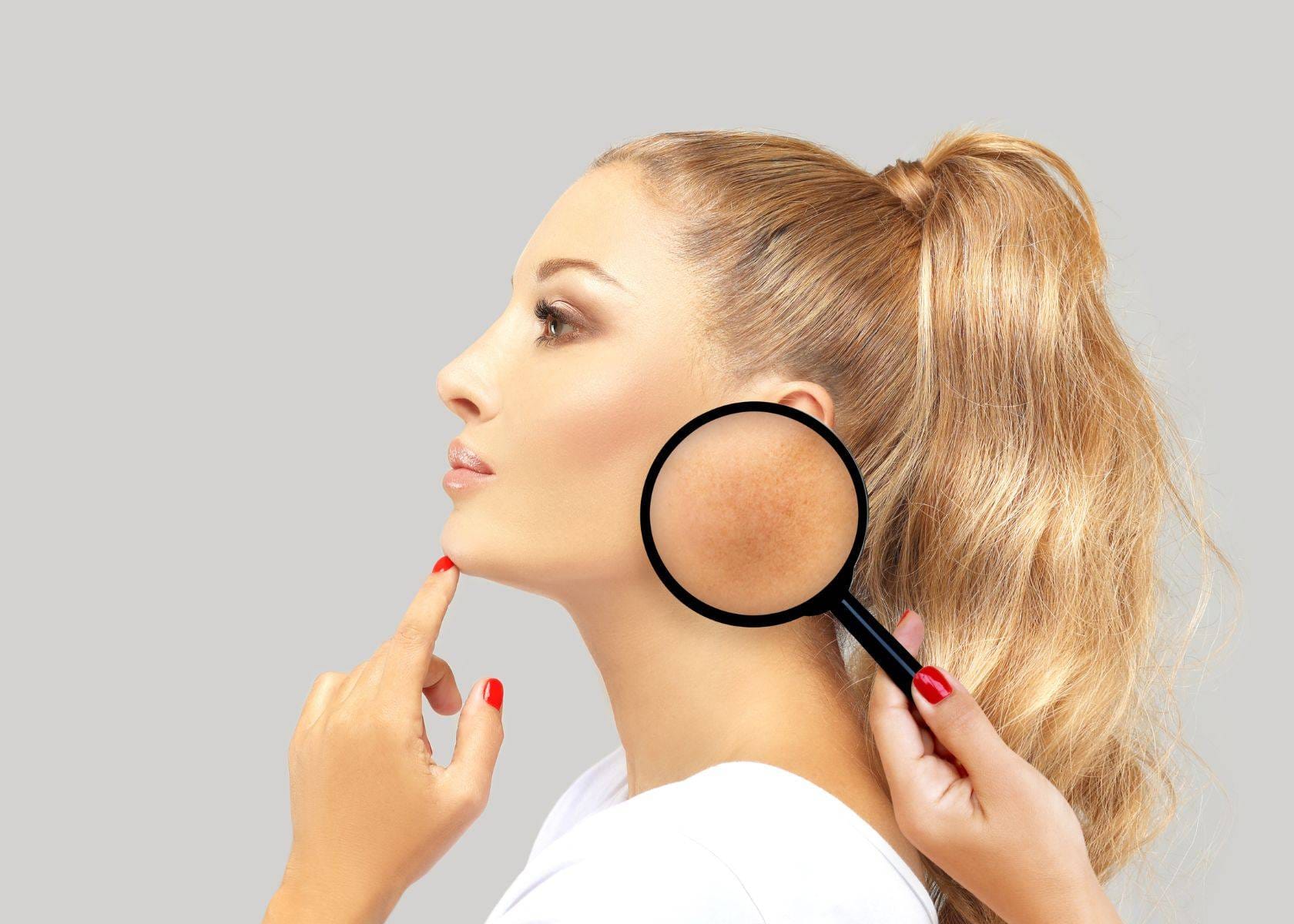Have you ever glanced in the mirror and spotted those unwelcome dark patches on your skin, maybe after noticing your clothes fitting a bit tighter? You're not alone in this.
Many of us have encountered these changes, wondering if there's any hope for reversal once we shed the extra weight.
In our journey and digging deep into research, one exciting discovery stood out: losing weight might just be what your skin needs to combat hyperpigmentation issues like acanthosis nigricans.
In this article, we will unravel the mystery behind those dark spots and explore how getting rid of excess weight could be your ticket to clearer, healthier-looking skin.
We'll delve into causes such as insulin resistance often linked with obesity and diabetes and provide actionable tips on tackling weight loss and hyperpigmentation hand in hand.
Prepare yourself for practical advice that has relieved many who've faced these challenges head-on. Are you ready for a transformation? Stick around as we dive in.
Key Takeaways
- Weight loss can improve the appearance of dark patches caused by acanthosis nigricans, a condition linked to obesity and insulin resistance. Shedding extra pounds helps decrease melanin production, leading to clearer skin.
- A balanced diet rich in antioxidants and regular physical activity are essential to managing weight and reducing hyperpigmentation. These lifestyle changes support overall health and contribute to healthier-looking skin.
- Consulting with dermatologists or skincare professionals provides personalized advice for treating hyperpigmentation. They may recommend treatments like topical retinoids, laser therapy, or chemical peels alongside dietary adjustments for better results.
- Adopting healthy habits such as proper skincare routines, protecting the skin from friction, and ensuring adequate moisturization can prevent further darkening of affected areas. This comprehensive approach addresses both weight management and improves hyperpigmentation concerns.
- Making consistent lifestyle adjustments over time is key to noticeable improvements in weight management and reduction of hyperpigmentation issues like dark inner thighs. Engaging in activities that promote better circulation also benefits overall skin health.
Understanding Acanthosis Nigricans and its Causes

Acanthosis nigricans is a skin condition characterized by dark, velvety patches in body folds and creases. These patches often appear on the neck, armpits, and groin. They are caused by high levels of insulin in the blood or due to insulin resistance. It is a form of post inflammatory hyperpigmentation.
Definition of acanthosis nigricans
Acanthosis nigricans is a skin condition that causes dark, velvety discoloration in body folds and creases. Often, these patches may develop on the neck, armpits, groin, or under the breasts.
This dark pigmentation is due to an increase in melanin. Our bodies create more melanin when we experience changes or disturbances internally.
This condition frequently signals underlying health issues like insulin resistance, often linked to obesity and diabetes. We need to understand that acanthosis nigricans can affect both overweight and slender individuals; however, it has a strong connection with being overweight.
Addressing its root cause primarily involves tackling obesity through weight loss and dietary adjustments to improve overall health.
Signs and symptoms
Acanthosis nigricans often appear as dark, velvety patches of skin in body folds and creases, such as the armpits, groin, and neck. It can also affect the hands, elbows, knees, or other areas when skin folds.
The skin may feel thicker than usual and have a raised appearance or wart-like growth. In some cases, itching is also experienced. These changes are usually noticed by patients themselves or during routine examinations.
Additionally, visible signs include darkening of inner thighs with no specific cause; this might lead to the assumption that weight gain is caused when acanthosis nigricans is most commonly linked to insulin resistance from obesity and diabetes rather than solely due to excess weight.
Causes of acanthosis nigricans
Acanthosis nigricans is primarily caused by insulin resistance and is often linked to obesity and diabetes. Other potential causes include hormonal disorders such as polycystic ovary syndrome, certain medications like corticosteroids, and genetic factors.
Moreover, acanthosis nigricans can sometimes be associated with internal malignancies, particularly in adult-onset cases. This condition can also occur in individuals without any underlying health issues due to genetic predisposition or unknown reasons.
Impact of Weight Loss on Hyperpigmentation

Losing weight can lead to a reduction in hyperpigmentation, particularly in conditions like acanthosis nigricans. Weight loss has been linked to improvements in dark spots and patches on the skin.
The link between weight loss and dark spots/patches
Weight loss can help improve the appearance of dark spots and patches on the skin, particularly in conditions like acanthosis nigricans. Reducing body weight can lead to decreased melanin production, which plays a significant role in hyperpigmentation.
Addressing the underlying causes of skin darkening through weight loss may contribute to the fading of these areas over time.
When losing weight, adopting a well-rounded approach that includes dietary changes and regular exercise is essential. Incorporating a diet rich in antioxidants can also support overall skin health while aiming for gradual and sustainable weight loss.
How weight loss affects acanthosis nigricans
Losing weight significantly impacts acanthosis nigricans, a type of hyperpigmentation that causes dark patches on the skin. As weight decreases, the amount of melanin in the skin is reduced, improving the appearance of hyperpigmentation.
This improvement is particularly noticeable in areas prone to friction and rubbing due to obesity, such as inner thighs. Additionally, weight loss can address underlying conditions like insulin resistance and obesity linked to acanthosis nigricans.
Ultimately, shedding excess pounds through healthy lifestyle changes positively influences weight management and skin health.
Other benefits of weight loss on skin health
Weight loss helps reduce acanthosis in Nigerians and offers additional benefits for skin health. As the body sheds excess pounds, it may lead to improved skin tone and texture, giving a more youthful appearance.
Furthermore, weight loss can help reduce the risk of developing other skin conditions, such as acne and rashes. Adopting a healthy diet rich in fruits and vegetables can provide essential nutrients that support overall skin health, contributing to a clearer complexion.
Regular exercise and physical activity associated with weight loss are essential in enhancing blood circulation and promoting oxygen delivery to the skin cells. This increased circulation supports collagen production, helping maintain elasticity and firmness in the skin.
Ways to Lose Weight and Address Hyperpigmentation

Consulting with a dermatologist is crucial for personalized advice. We encourage you to explore the various lifestyle changes and professional treatments that can help address hyperpigmentation effectively.
Finding the right solution through professional guidance
Consulting a dermatologist or skincare experienced is essential in finding the proper treatment for acanthosis nigricans and addressing hyperpigmentation caused by weight-related issues.
Dermatologists can offer personalized advice on medical treatments, such as topical retinoids or laser therapy, to help fade dark patches. Additionally, they can recommend cosmetic procedures like chemical peels to improve skin discoloration.
Seeking professional guidance ensures that the approach to managing hyperpigmentation aligns with individual skin types and overall health factors.
When seeking solutions for weight loss and hyperpigmentation, it's important to consult a healthcare provider specializing in nutrition and weight management.
A dietitian can provide tailored guidance on creating a balanced meal plan rich in antioxidants, which may aid in reducing skin darkening while supporting weight loss efforts.
Adopting a well-rounded approach
Finding the right solution through professional guidance is just the starting point. Adopting a well-rounded approach to weight loss and hyperpigmentation management involves making lifestyle changes supporting overall health and skin wellness.
This can include a balanced diet rich in antioxidants, regular physical activity, adequate sleep, and stress management.
Consulting a healthcare professional for personalized advice on nutrition, exercise, and skincare routines can help develop an effective strategy.
Maintaining consistency with healthy habits is essential for sustainable results. This comprehensive approach not only supports weight management but also contributes to improving skin health by addressing hyperpigmentation from multiple angles.
Making lifestyle changes
We can make lifestyle changes such as adopting a balanced diet, regular exercise routine, and proper skin care to address hyperpigmentation linked to weight gain. We should focus on consuming a diet rich in antioxidants and nutrients that support overall skin health.
Additionally, incorporating physical activity into our daily routine can aid in weight management and improve the appearance of hyperpigmented areas like dark inner thighs.
Regularly moisturizing and protecting the skin from friction can also help minimize further darkening caused by acanthosis nigricans.
Taking these steps towards a healthier lifestyle can positively impact our weight and hyperpigmentation issues.
Consistent adjustments to our habits can contribute to noticeable improvements in our skin's appearance.
Frequently Asked Questions

Can losing weight make hyperpigmentation go away?
Yes, losing weight might help reduce hyperpigmentation, especially if it's related to conditions like Acanthosis nigricans, often linked to obesity.
What is Acanthosis nigricans treatment after weight loss?
Treatment for Acanthosis nigricans usually involves improving diet and skin health, alongside managing underlying conditions. Losing weight can also be a part of the treatment plan.
How does diet affect my skin and hyperpigmentation?
A healthy diet contributes significantly to skin health by providing essential nutrients that can help reduce hyperpigmentation and improve overall skin condition.
Will all types of hyperpigmentation improve with weight loss?
Not all types will improve with weight loss since hyperpigmentation can have different causes, including sun exposure or hormonal issues unrelated to body weight. It is important to find out the underlying cause of dark skin.
Do you get darker when you gain weight?
There is no certain theory to back this hypothesis. However, it's true that some people may have their skin tone darkened as a result of gaining weight. However, it depends on other factors, such as skin type, hormonal changes, hormonal imbalances, highly processed foods, and others.
Conclusion
As we wrap up, remember that losing weight can positively impact acanthosis nigricans and other forms of hyperpigmentation. It's important to diagnose acanthosis nigricans and then maintain a healthy weight.
Embracing healthy lifestyle changes, such as a balanced diet and regular exercise, can significantly improve skin health. These practical steps are efficient and essential for addressing the underlying causes of hyperpigmentation.
Seeking professional guidance and making these adjustments will pave the way for visible results and overall well-being.
Let's take charge of our health confidently, knowing that positive changes can make a remarkable difference in our skin's appearance and overall quality of life.
References
- Galan, N., RN. (2022, November 18). Options for treating acanthosis Nigricans. Verywell Health. https://www.verywellhealth.com/options-for-treating-acanthosis-nigricans-2616655
- Ningthoujam, N. (2023, February 14). Got dark inner thighs? Weight loss might be the solution. Healthshots. https://www.healthshots.com/beauty/skin-care/got-dark-inner-thighs-weight-loss-might-be-the-solution/
Read More About Other Related Topics of Hyperpigmentation





